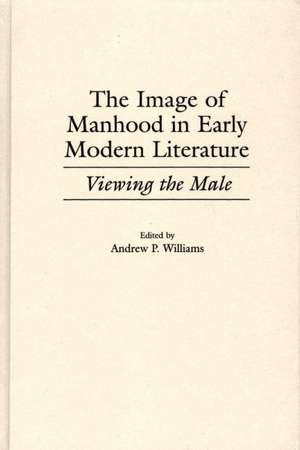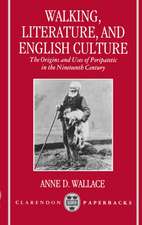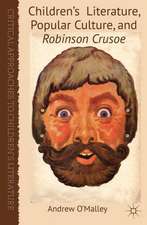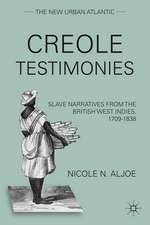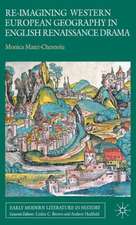The Image of Manhood in Early Modern Literature: Viewing the Male: Contributions to the Study of World Literature
Autor Andrew P. Williamsen Limba Engleză Hardback – 29 apr 1999 – vârsta până la 17 ani
Din seria Contributions to the Study of World Literature
- 19%
 Preț: 461.18 lei
Preț: 461.18 lei - 27%
 Preț: 438.33 lei
Preț: 438.33 lei - 28%
 Preț: 462.54 lei
Preț: 462.54 lei - 28%
 Preț: 437.57 lei
Preț: 437.57 lei - 30%
 Preț: 555.47 lei
Preț: 555.47 lei - 28%
 Preț: 436.57 lei
Preț: 436.57 lei - 24%
 Preț: 363.56 lei
Preț: 363.56 lei - 35%
 Preț: 462.45 lei
Preț: 462.45 lei - 38%
 Preț: 434.71 lei
Preț: 434.71 lei - 28%
 Preț: 461.69 lei
Preț: 461.69 lei - 35%
 Preț: 462.37 lei
Preț: 462.37 lei - 28%
 Preț: 438.00 lei
Preț: 438.00 lei - 28%
 Preț: 361.86 lei
Preț: 361.86 lei - 27%
 Preț: 439.17 lei
Preț: 439.17 lei - 24%
 Preț: 460.68 lei
Preț: 460.68 lei - 28%
 Preț: 434.88 lei
Preț: 434.88 lei - 38%
 Preț: 437.24 lei
Preț: 437.24 lei - 28%
 Preț: 344.31 lei
Preț: 344.31 lei - 28%
 Preț: 363.46 lei
Preț: 363.46 lei - 38%
 Preț: 437.24 lei
Preț: 437.24 lei - 27%
 Preț: 440.20 lei
Preț: 440.20 lei - 24%
 Preț: 461.77 lei
Preț: 461.77 lei - 28%
 Preț: 437.75 lei
Preț: 437.75 lei - 28%
 Preț: 436.73 lei
Preț: 436.73 lei - 28%
 Preț: 437.31 lei
Preț: 437.31 lei - 28%
 Preț: 344.98 lei
Preț: 344.98 lei - 28%
 Preț: 462.45 lei
Preț: 462.45 lei - 27%
 Preț: 509.69 lei
Preț: 509.69 lei - 27%
 Preț: 438.76 lei
Preț: 438.76 lei - 30%
 Preț: 509.86 lei
Preț: 509.86 lei - 28%
 Preț: 433.28 lei
Preț: 433.28 lei - 24%
 Preț: 464.05 lei
Preț: 464.05 lei - 38%
 Preț: 438.67 lei
Preț: 438.67 lei - 24%
 Preț: 460.93 lei
Preț: 460.93 lei - 28%
 Preț: 435.97 lei
Preț: 435.97 lei - 27%
 Preț: 616.53 lei
Preț: 616.53 lei - 28%
 Preț: 436.64 lei
Preț: 436.64 lei - 28%
 Preț: 462.12 lei
Preț: 462.12 lei - 27%
 Preț: 438.24 lei
Preț: 438.24 lei - 30%
 Preț: 551.51 lei
Preț: 551.51 lei - 28%
 Preț: 436.92 lei
Preț: 436.92 lei - 35%
 Preț: 413.48 lei
Preț: 413.48 lei - 28%
 Preț: 362.53 lei
Preț: 362.53 lei - 28%
 Preț: 437.75 lei
Preț: 437.75 lei - 27%
 Preț: 438.33 lei
Preț: 438.33 lei - 24%
 Preț: 461.60 lei
Preț: 461.60 lei - 28%
 Preț: 437.15 lei
Preț: 437.15 lei - 27%
 Preț: 437.47 lei
Preț: 437.47 lei - 27%
 Preț: 345.67 lei
Preț: 345.67 lei
Preț: 460.60 lei
Preț vechi: 637.32 lei
-28% Nou
Puncte Express: 691
Preț estimativ în valută:
88.13€ • 92.27$ • 72.93£
88.13€ • 92.27$ • 72.93£
Carte tipărită la comandă
Livrare economică 05-19 aprilie
Preluare comenzi: 021 569.72.76
Specificații
ISBN-13: 9780313307669
ISBN-10: 0313307660
Pagini: 216
Dimensiuni: 156 x 235 x 21 mm
Greutate: 0.45 kg
Ediția:New.
Editura: Bloomsbury Publishing
Colecția Praeger
Seria Contributions to the Study of World Literature
Locul publicării:New York, United States
ISBN-10: 0313307660
Pagini: 216
Dimensiuni: 156 x 235 x 21 mm
Greutate: 0.45 kg
Ediția:New.
Editura: Bloomsbury Publishing
Colecția Praeger
Seria Contributions to the Study of World Literature
Locul publicării:New York, United States
Notă biografică
ANDREW P. WILLIAMS is Assistant Professor of Early Modern Literature in the Department of English at North Carolina Central University. His previous books include The Restoration Fop: Gender Boundaries and Comic Characterization in Late Seventeenth Century Drama (1995), and his articles have appeared in such journals as The Midwest Quarterly and Early Modern Literary Studies.
Cuprins
IntroductionMasculine Disaffection and Misogynistic Displacement in Carew's Love Lyrics by Ian McAdamA Garden of Desire, A Meadow of Decay: Masculine Identity Crisis in Marvell's Mower Poems by Edward J. Whitelock"The blushing shame of souldiers": The Eroticism of Heroic Masculinity in John Fletcher's BONDUCA by Goran Stanivukovic"A place privileged to do men wrong": The Anxious Masculinity of THE MAID'S TRAGEDY by Lisa HopkinsManliness and Misogyny in Dryden's AENEID by Taylor CorseSoft Women and Softer Men: The Libertine Maintenance of Masculine Identity by Andrew P. WilliamsDisplacing Masculinity: Edward Kynaston and the Politics of Effeminacy by Thomas A. KingGodly Manliness: Defoe's Good Men in Bad Times by Stephen GreggCLARISSA's "Man of Violence" and GRANDISON's "Truly Good Man": Masculine Homogeneity in Richardson by Susan KorbaSelected BibliographyIndex
